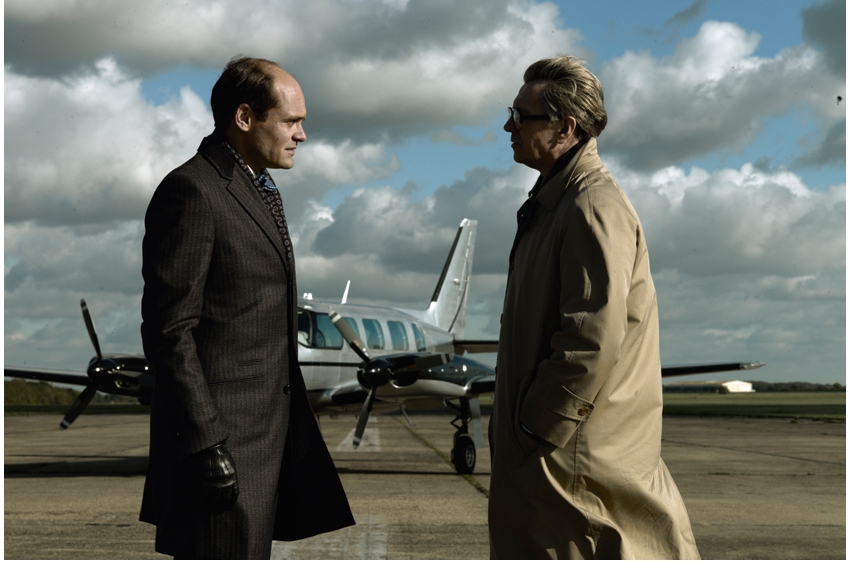This adaptation of John le Carré’s 1974 novel is so beautifully executed and so visually absorbing and so atmospherically hypnotic that I wonder this: would it have been awfully greedy to have hoped to have wholly understood it, too? I thought the plotting might be an issue — what do I know about spying? Me, who is nervous travelling beyond Brent Cross? Me, who has never broken down in Budapest, spouting all I know about Moscow? — so I took my father to the screening, who is keen on le Carré, and he was able to debrief me. Although, you know what? It kind of didn’t matter, and I kind of didn’t care. I was transfixed by every frame anyhow.
It’s not where the plot is going, but what it is doing to its characters, as they negotiate the quagmire of loyalty and betrayal in a world where no one can be trusted. You can’t love a film like this. It is much too bleak and chilly. But admire it? God, yes. As for my father and his debriefing abilities, he is available to rent by the hour but wants you to know he’s not cheap, likes a nap after lunch and won’t eat yoghurt. (Should you require him, phone and ask for ‘Denis’ which would be his codename if only it weren’t his real name. Alternatively, wait on Battersea Bridge until you get the nod from one of ours, although do watch out, as it could just as easily be one of theirs.)
This stars Gary Oldman as George Smiley. As I am new to Smiley as a character — I’ve never read the books; I didn’t see Alec Guinness in the BBC TV series — I can only say that, here, he seems isolated and desolate, like a man who has seen too much of life and is bleached of all proper colour, as is the film. This is almost entirely shot in Bakelite browns teamed with the icier end of the Farrow & Ball paint chart, so much so that when Smiley passes a grocery shop displaying oranges, those oranges seem too shockingly vivid. You will flinch, just as you will spend most of the film flinching. There is no pounding soundtrack. There are no car chases, high-speed or otherwise. Yet everything throbs with trepidation and menace. A clock ticking. The crunch of buttered toast. A fountain pen replaced on a desk. They all somehow set you on edge and keep you there. It’s miraculous, really,
The plot, or as much as I gathered of it, goes like this: Smiley, who has been forced into retirement, is brought back to uncover a traitor — yes, one of ours is gnawing from within, unless he’s one of theirs — at the top of ‘The Circus’, the highest echelon of British Intelligence headed by Control (John Hurt, who has a face like a collapsed pudding; I have served many puddings which look like Hurt over the years). The mole, apparently, has to be among Control’s top brass which includes Toby Jones, Colin Firth, Ciarán Hinds and David Dencik.
Each suspect has their own fully drawn character. Toby Jones’s character, for example, is ambitiously hateful, while Colin Firth’s is suavely nonchalant. Smiley investigates via quiet, studied infiltration, an intense intelligence and some very big spectacles. The plot twists extraordinarily. It twists once, twice and then, very possibly, it will twist away from you altogether. There are single agents, double agents and even triple agents (I think).
Every discovery is accompanied either by a further, reverberating complexity or by flashbacks scrambled in time, plus you have to keep track of a slew of other operatives, including Benedict Cumberbatch, Tom Hardy, Mark Strong, and Kathy Burke as blowsy Connie. Where has Kathy Burke been all this time? What can we do to make sure she doesn’t disappear again? That said, all the performances are wondrous and, mostly, wondrously still. Only John Hurt is ever allowed to let rip.
Directed by Tomas Alfredson (Let the Right One In) and with a script by Peter Straughan and Bridget O’Connor, this is a marvel of compression. As Oldman has said, bringing the book in at this length was like trying to squeeze an elephant into a phone box. And although narrative coherence does take something of a battering, like I said, it doesn’t seem to matter very much. Odd, I know, but true. This is a film about fear and disillusionment and what war does to people, whether that war is cold or hot and, in this way, it is thrillingly good. And that’s it, except to say that if you wish to call ‘Denis’ you must first let the phone ring twice, hang up, and then call again. That, if nothing else, should keep him on his toes.






Comments